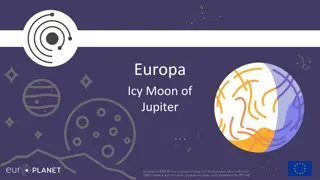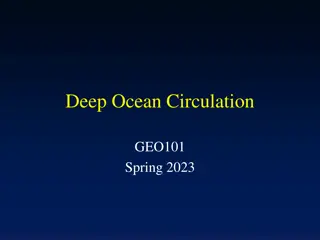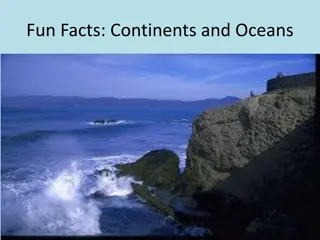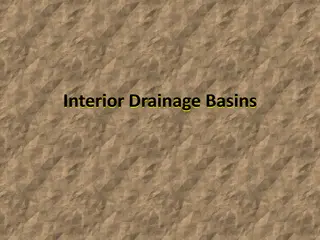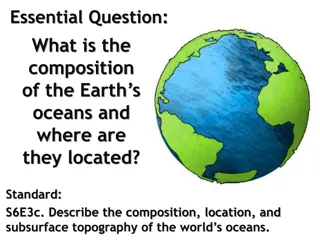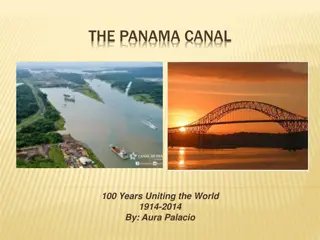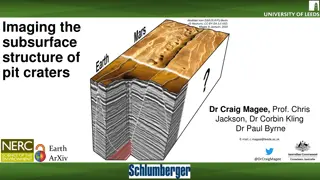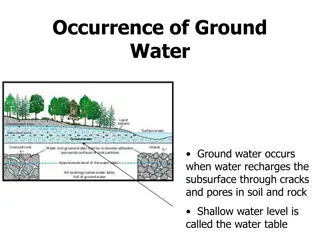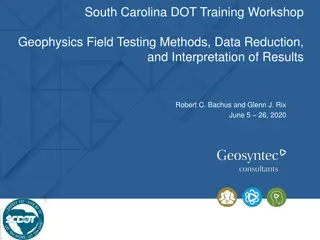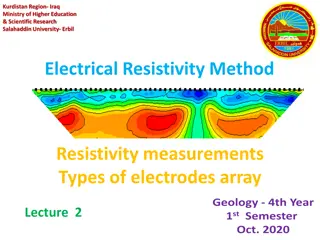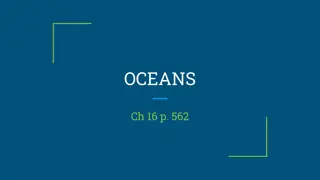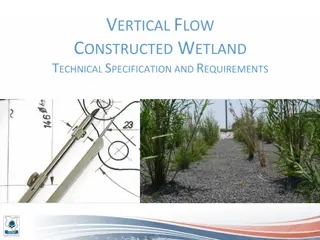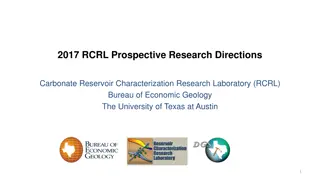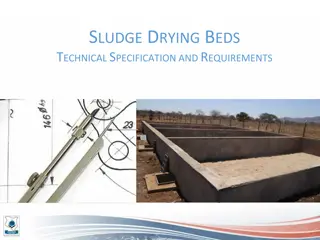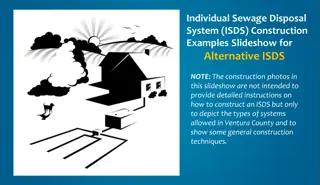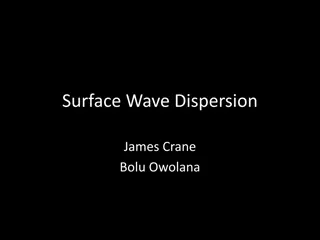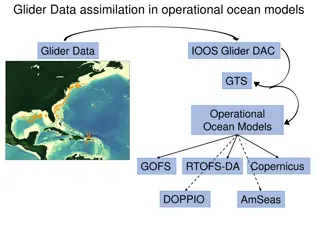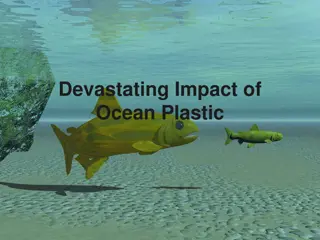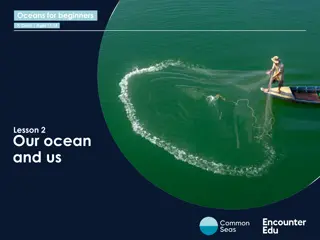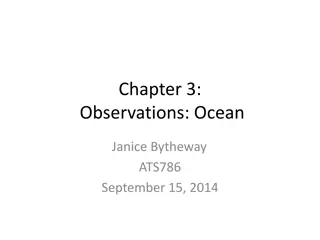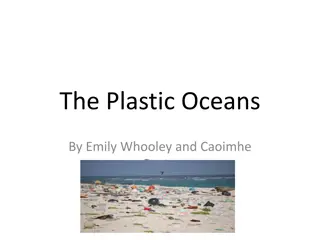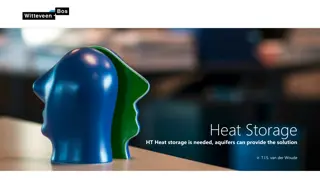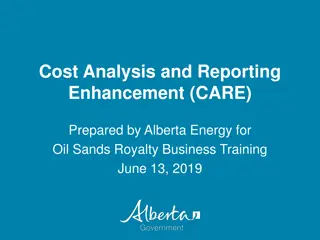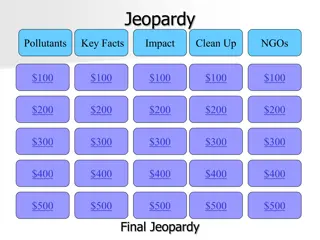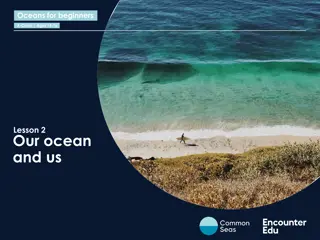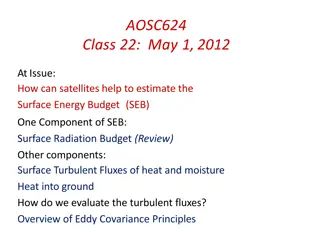A Presentation on Atmosphere-Ocean Interaction
Water covers 71% of the earth\\\\\\\\u2019s surface and contains 97% of the earth\\\\\\\\u2019s water. 60% of the world\\\\\\\\u2019s population live within 60 miles of the coast. This means that a significant amount of the earth\\\\\\\\u2019s population uses the oceans and other large bodies of w
37 views • 51 slides
Oceans, Wildlife, and Human Health, and the Urgent Call for Global Initiatives
Plastic pollution refers to the environmental harm caused by the accumulation of plastic waste in ecosystems, particularly oceans and waterways. From improper disposal and inefficient recycling, it severely threatens marine life, wildlife, and human health. The persistent nature of plastic compounds
6 views • 3 slides
Exploring Europa: Icy Moon of Jupiter and the Potential for Life
Europa, Jupiter's icy moon, offers fascinating insights into its composition, subsurface oceans, and potential for hosting extremophiles. Explore the geology, chaos terrain, and interaction between the ocean and crust. Could there be life on Europa? Learn how salt affects water freezing points and t
2 views • 12 slides
CYGNSS Earth Venture Mission Overview
The CYGNSS Earth Venture Mission involves eight satellites in low Earth orbit designed to measure near-surface wind speed over oceans and map soil moisture and inland water under vegetation on land. Launched in December 2016, the mission has been successful, currently in its extended phase with seve
2 views • 9 slides
Understanding Deep Ocean Circulation and Salinity Patterns
Explore the intricate relationship between ocean salinity, vertical structure, and deep-water currents in this informative collection of images and explanations. Discover how salt inputs and outputs influence ocean salinity levels, and learn about the factors that contribute to the vertical variatio
12 views • 21 slides
Fascinating Facts About Continents and Oceans
Explore intriguing facts about the continents and oceans of our planet; from the five main oceans to unique features of Antarctica and Africa. Discover the deepest point in the Pacific Ocean and interesting details about the Sahara Desert. Immerse yourself in the wonders of Earth's geography!
5 views • 10 slides
Understanding Interior Drainage Basins: Endorheic Systems and Dry Lakebeds
Explore the concept of interior drainage basins, including endorheic systems that do not drain to oceans but instead to closed basins. Learn about regions like the Great Basin, Sahara Desert, and Tarim Basin in China. Discover dry lakebeds such as the Great Salt Lake in Utah and Salar de Uyuni in Bo
3 views • 10 slides
Underwater Backscatter Channel: Theory, Link Budget, and Climate Monitoring
In response to the significant impacts of climate change on the world's oceans, a new technology called underwater backscatter is being developed for distributed ultra-low-power underwater sensor networks. This technology aims to enable climate monitoring, sea-level measurement, and hurricane respon
3 views • 18 slides
Effective Ways to Prevent Water Pollution
Despite the challenges facing our oceans, it is never too late to make a positive impact. By avoiding actions like pouring fat down the sink, disposing harmful chemicals in the wrong way, or flushing medications down the toilet, we can significantly reduce water pollution. Implementing good practice
3 views • 13 slides
Creating Trustworthy Green Hotels Around Oceans
This paper examines the impact of green service attributes on consumer trust in sustainable green hotels around oceans. The study focuses on 12 certified green hotels in India and explores how Green Service Encounters influence consumer trust and re-patronage intention. The findings reveal that trus
7 views • 6 slides
Exploring the Composition of Earth's Oceans
Delve into the composition, location, and subsurface topography of the world's oceans, discovering the chemical makeup of ocean water and its vast salt content. Uncover fascinating facts such as how the salt in the oceans could create a 500-foot thick layer if spread over Earth's land surface. Engag
1 views • 16 slides
The Panama Canal: A Historical Engineering Triumph
The Panama Canal, a symbol of global unity, connects the Atlantic and Pacific Oceans. Its construction faced challenges, including the failed French attempt and Panama's revolution. The canal's completion in 1914 marked a significant milestone, significantly reducing travel time between oceans. Lear
0 views • 21 slides
Exploring Subsurface Structures of Pit Craters Through Seismic Reflection
Discover the technique of seismic reflection imaging to unveil the subsurface structures of pit craters on Earth and Mars. Follow the analysis of seismic data to map pit craters and their connections to geological features like dykes and fault jogs, shedding light on the formation processes of these
0 views • 11 slides
Understanding Groundwater: Occurrence, Recharge, and Movement
Groundwater occurs when water seeps into the subsurface through cracks and pores in rocks and soil, forming the water table. Recharge happens naturally through processes like precipitation and snowmelt, as well as artificially through methods like recharge wells and water spread over land. The movem
0 views • 8 slides
Geophysics Field Testing Workshop: Methods and Interpretation
This workshop on geophysics field testing covers a range of methods such as downhole and surface testing, spectral analysis, seismic refraction, and more. Geophysical investigations help assess subsurface properties efficiently and non-invasively, offering valuable insights for site exploration and
1 views • 16 slides
Understanding Resistivity Measurements in Geology
Explore the concept of resistivity measurements in geology, focusing on electrode configurations such as Wenner and Schlumberger arrays. Learn about the potential differences in electrode setups and how to calculate apparent resistivity through geometrical factors. Various electrode arrangements and
0 views • 22 slides
Exploring Earth's Oceans: From Formation to Technology
Earth's oceans are interconnected bodies of water covering about 70% of the planet. This chapter delves into the formation of oceans, the composition of seawater, the structure of the seafloor, and the technology used to explore the depths. Learn about the theories behind ocean formation, the differ
0 views • 24 slides
Vertical Flow Constructed Wetland Technical Specifications and Requirements
The technical specifications for a vertical flow constructed wetland include requirements for subsurface compacting, lining materials such as clay layers and plastic liners, perforation of pipes, watertight installation of underdrain pipes, central drainage channel design, and filter media compositi
0 views • 11 slides
Using AI to Combat Plastic Pollution in Oceans
The project, "Use of AI to reduce plastic in the ocean," tackles the pressing issue of plastic pollution in oceans by leveraging Artificial Intelligence. The team of students from Microsoft High School aims to make a significant impact on reducing plastic waste and safeguarding marine ecosystems thr
0 views • 14 slides
RCRL Prospective Research Directions in Carbonate Reservoir Characterization
The RCRL group at the University of Texas at Austin specializes in research on carbonate reservoirs at various scales, from nanopores to basin architecture. They focus on developing predictive relationships and tools for reservoir characterization based on subsurface datasets and outcrop analogs. Th
1 views • 12 slides
Remote Control of ATV Team with myRIO and Shared Variables
Developing a remote control system for an ATV team using myRIO to manage functions like steering, throttle, choke, brakes, and start/stop via WiFi communication. Components like Haydon Motor Controller, Sabertooth 2x25 for steering, relays for brakes/start/stop, and shared variables enable efficient
0 views • 13 slides
Sludge Drying Beds Technical Specifications and Requirements
This document outlines the technical specifications and requirements for sludge drying beds. It covers aspects such as subsurface compacting, lining materials, underdrain pipes, filter media, and slabs. The beds are designed with specific slopes for drainage efficiency and proper placement below gro
0 views • 6 slides
Ventura County ISDS Construction Examples Slideshow
This slideshow showcases different construction stages of Individual Sewage Disposal Systems (ISDS) in Ventura County, providing an overview of the types of systems allowed and general construction techniques employed. From the installation of pressurized distribution beds to completed mounds with l
0 views • 15 slides
Understanding Surface Wave Dispersion in Seismic Exploration
Surface wave dispersion, explored by James Crane and Bolu Owolana, plays a crucial role in seismic studies. This phenomenon, involving waves spreading at varying speeds, helps evaluate subsurface characteristics based on wavelength. By studying surface waves, researchers can determine velocity, dens
0 views • 14 slides
Algae: Oceans' Unsung Heroes
Algae play a critical role in our planet's ecosystem, outnumbering plants on land. The oceans are teeming with microscopic algae and seaweeds, essential for marine life. Without algae, our oceans would be barren, highlighting their crucial ecological importance.
0 views • 45 slides
Operational Ocean Modeling and Forecasting Systems
This content provides an overview of various operational ocean modeling and forecasting systems, including data assimilation processes, glider data, surface and subsurface data sources, forecasting models for hurricanes, and NOAA's hurricane forecasting models. It covers a range of technologies and
0 views • 16 slides
Multiphase Flows in the Upstream: A Comprehensive Overview
This content delves into the complexities of multiphase flows in the upstream sector, covering topics such as reservoir management, drilling, subsurface imaging, and reservoir modeling. It explores the challenges of multi-scale phenomena, multi-physics interactions, uncertainty, and inversion in the
0 views • 4 slides
Alarming Impact of Ocean Plastic Pollution
The oceans, essential for life on Earth, are facing a crisis due to the staggering amount of plastic waste being dumped into them. This pollution disrupts marine ecosystems, threatens biodiversity, and harms marine life. Urgent action is needed to reduce plastic use, recycle responsibly, and safegua
0 views • 35 slides
Exploring Ecological Goods and Services in Our Oceans
Delve into the fascinating world of ecological goods and services provided by our oceans. Discover the tangible products and intangible benefits humans derive from marine ecosystems, including provisioning services like food and raw materials, regulating services such as climate regulation and coast
0 views • 14 slides
Insights on Ocean Climate Change: Observations and Implications
Observations in this chapter highlight significant changes in ocean properties related to climate over the past 40 years. These changes include shifts in temperature, salinity, sea level, carbon levels, pH, and oxygen content. The patterns of change observed suggest a link between surface and subsur
0 views • 35 slides
The Plastic Oceans - A Harsh Reality and Call to Action
Dive into the devastating impact of plastic pollution on our oceans, from the sources of microplastics to the damage inflicted on marine life. Learn about the alarming facts, including the projection that by 2050, there will be more plastic than fish in the ocean. Discover how you can help combat th
0 views • 8 slides
Innovative Solution for Heat Storage Using Aquifers
Heat storage is crucial, especially during winter, and aquifers present a viable solution. By utilizing subsurface as an insulator and tapping into tertiary sand deposits, applications for shallow and deep geothermal energy are feasible. The concept of a Hot Water Battery offers an efficient means o
0 views • 12 slides
Cost Analysis and Reporting Enhancement (CARE) for Oil Sands Royalty Business
Enhance your oil sands royalty business with the Cost Analysis and Reporting Enhancement (CARE) program by Alberta Energy. CARE assists in assessing the effectiveness of the Royalty Regime, supports policy development, strategic planning, and forecasting processes. It provides project assessment, tr
0 views • 45 slides
Understanding Radiative Transfer and Volume Path Tracing
Explore the mathematical model of radiative transfer for simulating light scattering in participating media and translucent materials through volume path tracing. Learn about subsurface scattering and how radiance changes along ray segments in participating media. Delve into the origins and applicat
0 views • 44 slides
Ocean Pollution Jeopardy: Key Facts and Pollutants Impact
Explore the devastating impact of pollutants on oceans through a Jeopardy-style game showcasing key facts about plastic pollution, offshore facilities, waste disposal, sea turtle endangerment, and common ocean trash items. Learn about the Great Pacific Garbage Patch, plastic island formation, and th
0 views • 27 slides
Understanding Ecological Goods and Services from Our Oceans
Explore the importance of ecological goods and services provided by oceans in Lesson 2 of the Oceans for Beginners curriculum. Learn about the tangible products, benefits, and services derived from ocean ecosystems, and reflect on their significance. Understand the categories of ecological services
0 views • 15 slides
Satellite Applications in Estimating Earth's Surface Energy Budget
Satellites play a crucial role in estimating the Surface Energy Budget (SEB) by providing data on various components such as Surface Radiation Budget and Surface Turbulent Fluxes. The SEB includes factors like net radiation flux, sensible and latent heat fluxes, and subsurface heat transfer. Satelli
0 views • 38 slides
Understanding Classification of Discontinuities in Metal Processing
Classification of discontinuities in metal processing involves identifying interruptions in the normal physical structure, such as cracks, seams, and inclusions, which may or may not be defects. Discontinuities can be surface or subsurface, with surface ones being more likely harmful. The origins of
0 views • 29 slides
Deciphering Climate Variability Through Ocean Buoys Data Collection
Ocean buoys like TAO/TRITON provide valuable data on climate variability by measuring various parameters like sea-surface temperature, wind speed, humidity, and subsurface temperatures. Anomalies from normal conditions help identify patterns over time, aiding in understanding climate changes. Mainta
0 views • 5 slides
Exploring Geographic Features: From Oceans to Volcanoes
Discover the diverse range of geographic features, from vast oceans and intricate coral reefs to winding rivers and dense forests. Learn about intriguing formations like peninsulas, isthmuses, and straits, and delve into natural wonders like sinkholes and wetlands. From coastal regions to volcanic l
0 views • 29 slides


